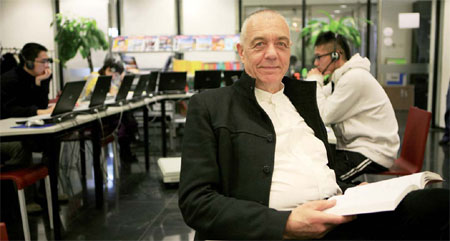Many miles to go for China

| Michael Kahn-Ackermann, senior adviser to the Confucius Institute, says China should give more emphasis to cultural imagination and creativity. Provided to China Daily |
German Sinologist says nation still has much to do in terms of cultural strides
Over the last 35 years, Michael Kahn-Ackermann has witnessed the remarkable changes and strong economic resurgence of China. But the 66-year-old German Sinologist believes that China still lags the West when it comes to making significant cultural strides.
That Kahn-Ackermann's heart still ticks for China is more than evident when after a long and illustrious career as the president of the Goethe-Institute China he decided to join the Confucius Institute, a non-profit organization dedicated to promote Chinese language and culture worldwide, as senior adviser.
The new role, says Kahn-Ackermann, has given him an opportunity to help the world better understand contemporary China, particularly Chinese culture, through frequent cross-cultural exchanges.
"China has developed its economic and political prowess, but still is relatively weak when it comes to culture in the global arena," he says.
But what China really needs to do is to ensure that its cultural exports promote creative cooperation and are also in sync with what the rest of the world wants. These steps will not only make China a cultural giant but also considerably improve its global image, he says.
"Chinese people love to see Hollywood films. It is not because Barrack Obama wants them to see it, but because the Hollywood producers are masters of the global culture game and know what kind of stories would appeal to global audiences."
Though China has an attractive culture, it still needs to offer something that others are curious and interested to know about, Kahn-Ackermann says. "You cannot convince anyone to be interested in Chinese culture by exporting something that does not even interest them."
Setting up Confucius Institutes is a smart move by China to expand its cultural influence, he says, as these institutions are patterned more on the lines of what the world wants.
"There is now more than ever a global need to learn Chinese, as people are getting more and more curious about China, due to its rapid economic and political strides. It is natural that they want to know more about China through the language. But the chances of learning Chinese in foreign countries are extremely limited. China has made a wise decision by setting up the Confucius Institutes for promoting Chinese learning," Kahn-Ackermann says.
According to him, the Confucius Institute is not only an innovative attempt, but also an institutional concept model developed by China for other nations to emulate. Unlike other independently organized language and culture promotion centers such as France's Alliance Francaise and Germany's Goethe-Institute, the Confucius Institutes cooperate with established universities, colleges and secondary schools around the world. Every institute is managed by the combination of a Chinese director and a foreign counterpart.
"Having two people with completely different cultural backgrounds and experience of working together in one organization is a very complicated and difficult thing. It needs a lot of mutual understanding, patience, goodwill and learning capacity.
"Despite some niggles, I think the Confucius Institute is an ideal international inter-cultural cooperation institution that also shows China's willingness to cooperate with other countries."
By setting up more such institutions globally, Kahn-Ackermann says China can also enhance its soft power considerably.
"Soft power in my understanding is the capacity to cooperate. It is not to make you believe what I believe or try to convince you that my morals are better than yours. Nor is it a means of conquering without weapons, but rather of successful and creative cooperation."
To improve China's cultural attractions, in addition to helping people from different cultural backgrounds, the nation also needs to have more cross-cultural exchanges and cooperation.
"At the moment, China's cultural development is not following the speed of economic development. It is impossible to create a great culture if you put a lot of money and technical knowledge into it. Culture is a field with its own rules."
He says that China in recent years has built up thousands of different cultural infrastructure such as huge museums, concert halls and theaters, but more emphasis needs to be given to cultural imagination and creativity. "Building museums and concert halls are necessary, but much more important is what you put into those buildings. A magnificent building can be an empty shell without essence."
"Even a very humble building with masterpieces in it is much better than a huge beautiful museum without content."
Kahn-Ackermann says that China needs an unconventional and unrestricted grassroots culture development to foster talent, and a strong infrastructure to utilize these talents.
"Many of the top Hollywood directors did not begin their careers there, but rather as independent directors who were welcomed with open hands by Hollywood. That is what China needs to learn from the Western countries in their soft power construction."
At the same time China also needs to be more open to imported culture rather than viewing it as a threat and win trust from other countries by showing the world the complication of Chinese culture.
"I think Chinese culture will develop its own identity not by closing doors, but in a way of absorbing merits of foreign culture and making them its own, which can enrich Chinese culture and make it more appealing to the outside world."
He says it is not necessary for a person belonging to a different culture to love Chinese culture, but if their curiosity is sparked, they will be more than keen to understand the culture.
"Culture is the best way for people to understand the different ways of thinking, living and behavior, and also something that makes them curious. The same rules apply when it comes to Chinese culture also," he says.
"When people find out that Chinese culture is much more complicated than Western media clichs, they will be interested in China, its people and the different ways of doing things. This is the real soft power."
liulu@chinadaily.com.cn
Today's Top News
- Nation's euro bond sale shows investors' confidence
- No soft landing for Tokyo's hard line
- Commerce minister urges US to increase areas of cooperation
- Strong demand for China's sovereign bonds signals global confidence
- Ministry urges Japan to 'maintain self-respect'
- Forge closer ties with Zambia, says Li































